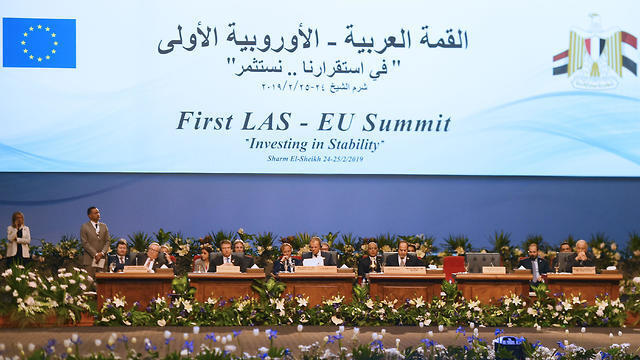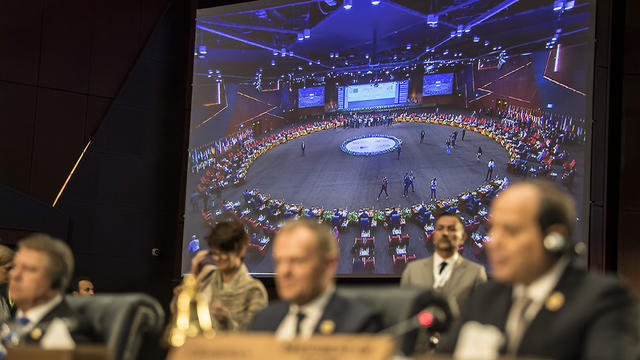Getting your Trinity Audio player ready...
With internal European tensions over immigration and Britain's imminent exit from the European Union (aka Brexit), and continuing Arab division over courses of action to end regional conflicts, expectations were low for substantive outcomes at the EU-League of Arab States summit in Sharm El-Sheikh, Egypt. But the two international blocs found the Israeli-Palestinian conflict to be a point of convergence between them.
and Twitter
Palestinian sources said they are extremely pleased with the draft of the final communique of the summit, which was to conclude Monday afternoon.
The draft will include strong language reaffirming support for the two-state solution based on a territorial compromise along the lines of the 2002 Arab Peace Initiative, thereby endorsing Palestinian claims to East Jerusalem and censuring Israeli settlement construction in lands captured during the 1967 Six-Day War.
The statement was to “stress that the Israeli settlements are illegal according to United Nations Security resolutions, mainly (resolution) 2334,” Palestinian diplomats said.
2 View gallery


A general shot shows the closing session of the first joint European Union and Arab League summit in the Egyptian Red Sea resort of Sharm el-Sheikh, on February 25, 2019
(Photo: AFP)
The 50-nation gathering aims to address challenges of mutual interest including illegal immigration and terrorism and develop joint approaches to the conflicts in Syria, Yemen and Libya under the rubric of “Investing in Security.”
Palestinian President Mahmoud Abbas received a green light from Egyptian President Abdel al-Fattah al-Sisi to place his cause at the center of the summit agenda.
“Our challenges have also been embodied in the hotbeds of conflict in the region, foremost among them the Palestinian cause, which is the central and primary cause of the Arabs, and one of the main roots of these conflicts,” Sisi told conference attendees. “I cannot but warn of the repercussions of the continuation of this conflict on all our countries,” he said.
2 View gallery


A big screen shows the venue of the first joint European Union and Arab League summit behind Egyptian President Abdel Fattah al-Sisi (R) and European Council President Donald Tusk (C) during the final session of the meeting in the Egyptian Red Sea resort of Sharm el-Sheikh
(Photo: AFP)
Abdalrahim Al Farara, Palestinian Ambassador to the European Union, likewise emphasized the urgency of the matter, saying “because we are running out of time, we need to find a new international mechanism—one that is not held by the Americans who have proven that they are incapable of being fair mediators by backing only Israel.
“All 28 EU countries are trying to find a solution for the Palestinian state and we think we are at the moment where all the members are going to move forward to recognize it,” said Al Farara. “The EU and the Arab League now will work for an international peace conference,” he added.
“President Sisi and the other Arab leaders made it clear that we will not be able to achieve anything in terms of cooperation on security or migration until we find a solution for the Palestinians and the key to the peace of the world.”
Once the attendance of both German Chancellor Angela Merkel and British Prime Minister Theresa May was confirmed, it became clear that the unprecedented conference would be a feather in the cap of the Egyptian president, who has won Brussels’ respect for his tough enforcement of a Mediterranean migration deterrence plan.
Sisi claims the Egyptian coast guard prevented a total of 11,000 refugees from migrating to Europe in 2018. This, as Cairo’s diplomats press hard for EU financial support similar the $7 billion allocated in 2015 to Sisi’s arch-rival Turkish President Erdogan to “manage” the flow of Syrian refugees.

